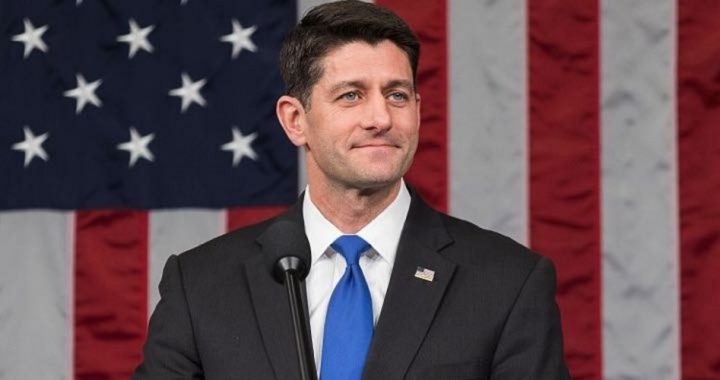
“The House just voted to rebuild our military, secure our borders, and give our service members their largest pay raise in eight years,” House Speaker Paul Ryan (R- Wis.) said late last month, in praising the passage of the $1.3 trillion, 2,232-page omnibus spending package. Perhaps more than anything else, that bill summed up the disappointing tenure of Ryan. While the bill dispirited millions of Republican activists, Representative John Yarmuth, a Kentucky Democrat, was quite happy with the deal: “We got about 80 percent of what we were trying to get,” he said.
Because of this, few conservatives are disappointed at the announcement on Wednesday that Ryan will not seek reelection in this fall, after serving 10 terms in Congress. His lukewarm 59 percent score on the “Freedom Index” (produced by The New American magazine to measure the fidelity of members of Congress to the U.S. Constitution) illustrates the middle-of-the-road approach taken by Ryan during his years in the House.
“You realize something when you take this job. It’s a big job with a lot riding on you,” Ryan told reporters Wednesday morning, in announcing that he would finish out his term and retire.
President Donald Trump tweeted, “Speaker Paul Ryan is truly good man, and while he will not be seeking re-election, he will leave a legacy of achievement that nobody can question.”
Ryan’s political career seemed to be on course to perhaps eventually put him into Trump’s job in the White House. He ran for vice president in 2012 as Mitt Romney’s running-mate, and even after that loss, he was easily tapped to replace John Boehner as speaker in 2015. Many expected him to run for president himself in 2016. When he first entered the House, Ryan had claimed that he was inspired by libertarian Ayn Rand.
Exactly what Ryan wound up using from Rand’s political philosophy is not quite clear. Ayn Rand Institute (ARI) fellow Don Watkins noted in 2012 that while Rand consistently called for an end to government entitlements, “Ryan’s goal, by contrast, is not to end the entitlement state but to save it.” And in the area of foreign policy, ARI fellow Elan Journo commented in 2012, “Clearly, Paul Ryan does not share Rand’s foreign policy,” as Ryan’s propensity of interventionism was in stark contrast to Rand’s noninterventionist view. Finally, earlier this year, ARI research associate Carl Svanberg remarked that Ryan’s proposed healthcare reform “doesn’t even start to move us in the right direction. On the contrary, it entrenches some of the most destructive features of Obamacare.”
An area in which Ryan often sparred with Trump was on immigration policy. Ryan has long been a supporter of amnesty and open borders, Personal Liberty argued, “and is seen as a tool of the corporatist wing of the GOP.” Ryan was certainly a darling of those who favored multilateral trade treaties, such as the corporate globalists who appear to care little about how these deals adversely affect the national sovereignty or economic well-being of America.
Ryan did not rule out a run for president in the future, but for now he said he wanted to spend more time with his family, before all his kids are grown.
With Ryan’s exit from the speaker’s chair, attention quickly shifted to who might succeed him in that position. The person most likely to win the post is thought to be Majority Leader Kevin McCarthy from California. McCarthy’s “Freedom Index” score is not significantly different from Ryan’s, however — a 63. Conservative Review ranks him No. 18 in the list of Top 25 RINOS. The other person who has been mentioned is Steve Scalise of Louisiana, whose Freedom Index rating is slightly better, at 69. Scalise made national news, in a difficult way, when he was shot last year by a Democratic Party activist while practicing to participate in the Congressional Softball Game.
But of even graver concern for Republicans in Congress is that the Republicans may not even be in a position to select the next speaker. Public opinion polls indicate that the Democrats have a good shot at winning enough seats in the 2018 mid-terms to take over the majority in the House of Representatives. Historically speaking, the party that controls the White House usually loses seats in the first mid-term following the presidential election. This happened even with Ronald Reagan in 1982, despite his 49-state landslide two years later. Bill Clinton’s Democrats lost control of the House in 1994, for the first time in about 40 years. Barack Obama’s Democrats lost even more seats in 2010, to lose control of the House. Generally speaking, this is because the party that controls the White House is not as motivated as the party that does not. This time, the Republican base is hardly charged up to lie across the tracks for their House members who passed the mammoth omnibus spending bill.
Even Ryan’s seat in Wisconsin might be in danger of flipping. Randy Bryce, an iron worker, has raised an astounding $4.75 million, in anticipation of challenging Ryan.
In short, Ryan’s “moderate” politics produce poor public policy, and do not appear to have produced a winning political strategy going into the 2018 mid-term elections.
Photo of Paul Ryan: U.S. Congress



